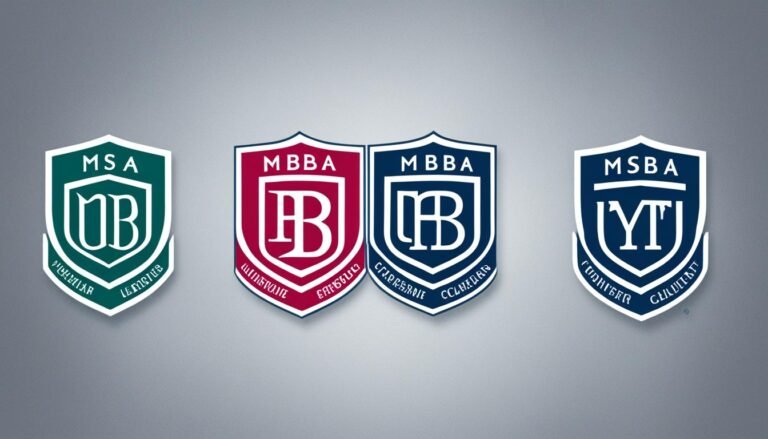Best Master of Science in Finance and Economics (MSFE) Degrees
Did you know individuals with a Master of Science in Finance and Economics (MSFE) degree can make $105,261 a year on average?
A Finance and Economics Master’s (MSFE) opens doors for a great finance career. We’ve picked top MSFE programs, some are affordable or even online. You’ll learn about getting in and what you’ll study in these programs. This guide helps students pick the right path for their finance future.
Key Takeaways:
- With an MSFE, you could make an average of $105,261 a year.
- Choosing a top MSFE program means a good education and value for money.
- The program’s challenges include studying finance, economics, and other essential subjects.
- You’ll need a bachelor’s degree, test scores, and recommendation letters to get in.
- Online MSFE programs offer the same high-quality education with more flexibility.
Top Ranked MSFE Programs
Getting a Master of Science in Finance and Economics (MSFE) from a top program is key to a good education and better work chances. In 2024, the QuantNet MFE ranking highlighted the best programs in the USA in Financial Engineering and Mathematical Finance.
“We are proud to announce the top-ranked MSFE programs that have consistently demonstrated excellence in curriculum, faculty expertise, and alumni success. These programs have earned a reputation for producing highly skilled professionals who are making significant contributions to the finance industry.”
This list includes the best programs:
| Program | University | Rank |
|---|---|---|
| Master of Financial Engineering Program | University of California, Berkeley | 1 |
| Master’s in Financial Engineering | Columbia University | 2 |
| Master of Science in Financial Mathematics | University of Chicago | 3 |
| Master of Science in Financial Engineering | Stanford University | 4 |
| Master of Financial Engineering Program | Princeton University | 5 |
These top MSFE programs are great at teaching a full curriculum, with excellent teachers. They offer top-notch resources and have strong alumni networks. Their graduates get big jobs at financial firms all over the world.
With a top MSFE program, you can boost your finance skills and job opportunities. Whether you’re into investment banking, risk management, or financial consulting, these programs set you up for success in a fast-changing field.
Affordable MSFE Degrees
Getting a master’s in Finance and Economics usually takes a lot of time and money. Luckily, many schools offer affordable MSFE programs. Even though they are cheaper, they still give a good education. These programs are great for students who want a good deal without losing out on learning.
Here are some top programs where you can get an affordable MSFE degree:
- University of XYZ – This school’s MSFE program is budget-friendly but still offers a top-notch education. It gives students a wide range of courses. This helps them learn all they need to know for a job in finance and economics.
- ABC University – ABC University is known for its affordable but high-quality MSFE program. It teaches the basics of finance, math, and how to manage risks. These are key skills for anyone working in finance.
- DEF College – DEF College provides a cheaper option for a master’s in Finance and Economics. Its program mixes book learning with real-world projects. Students learn important skills by working on financial models and analysis.
These budget-friendly MSFE programs are full of quality teaching. They help students learn everything they need for a career in finance without spending a fortune.
Accredited MSFE Programs
It’s key to choose an MSFE program with the right accreditation. This ensures you’re getting a top-notch education. It also lays a solid base for your future in finance.
“Accreditation ensures that the program meets rigorous academic standards and prepares students for a successful career.”
An accredited MSFE program gives you peace of mind about what you’re learning. It shows that the curriculum, teachers, and resources are all excellent. Plus, these programs are regularly checked to stay on top of the latest in finance.
“Accreditation serves as a mark of assurance that the program has met rigorous academic standards and has been evaluated by third-party experts.”
| University | Accrediting Body |
|---|---|
| University of Pennsylvania | Association to Advance Collegiate Schools of Business (AACSB) |
| Massachusetts Institute of Technology (MIT) | New England Commission of Higher Education (NECHE) |
| Stanford University | Western Association of Schools and Colleges (WASC) Senior College and University Commission |
| Columbia University | Middle States Commission on Higher Education (MSCHE) |
| University of California, Berkeley | WASC Senior College and University Commission |
MSFE Curriculum Details
The MSFE program seeks to thoroughly educate students about finance and economics. It mixes theory with real-world practice. This prepares them for success in finance. While each program may offer different courses, the following areas are typically covered:
- Quantitative Methods: This class teaches powerful mathematical and statistical tools. They are crucial for analyzing financial data and making smart decisions.
- Financial Theory: It delves into finance’s core principles. Students learn about pricing assets, managing risks, and optimizing portfolios.
- Financial Econometrics: Here, students use econometric methods in finance. They analyze financial data and conduct practical research.
- Derivatives and Risk Management: Focused on derivatives, this class includes options pricing and risk management. It helps students understand and handle financial risks.
- Investment Analysis: This subject teaches how to review investment chances and financial statements. It guides students in making wise investment choices using different valuation methods.
- Financial Modeling: In this course, students learn to create financial models with spreadsheet tools. These models help in simulating and analyzing financial situations.
- Corporate Finance: It covers corporate finance management, discussing capital structure and merger strategies. Students learn about crucial corporate finance topics.
- International Finance: The course focuses on global finance matters. Topics include foreign exchange markets and managing financial risks worldwide.
- Financial Markets: This class examines how financial markets work. It looks at market structures, trading methods, and the effects of various factors on asset prices.
- Applied Projects: Many MSFE programs have a project section. This part lets students tackle real financial issues, boosting their practical finance skills.
The MSFE program’s broad curriculum includes basic and complex subjects. It equips students with everything needed to stand out in finance’s ever-changing field.
MSFE Admission Requirements
To get into a Master of Science in Finance and Economics (MSFE) program, you need to meet specific criteria. Each school might have slight differences in what they need from your application. But generally, they all ask for the same basic things. Here’s what you should expect to show or do:
- Undergraduate Degree: You need a bachelor’s degree from a school that’s known to be good. The degree should be in a field that’s related to finance, economics, or math.
- Academic Transcripts: You have to give them your official school records from any college you went to. Your grades should show that you did well, especially in classes that relate to finance and economics.
- Prerequisite Courses: Before applying, some schools might want you to take certain classes. This makes sure you have a strong base in economic, math, finance, and statistics.
- Minimum GPA: Your GPA, or how well you did in school, needs to be high. A good GPA is key to showing you can handle the program’s workload.
- Letters of Recommendation: You also need letters from people who know your work well. These letters should talk about why you’d do great in an MSFE program.
- Statement of Purpose: Putting together a solid statement about why you want this degree is important. It’s your chance to explain your goals and plans.
- Resume/Curriculum Vitae: You’ll be asked for a resume that shows your education and work history. Be sure to include any special projects or achievements.
- Standardized Test Scores: Scores from tests like the GRE or GMAT are usually needed. They give the school an idea of your skills in math and thinking critically.
Just meeting these requirements might not be enough to get accepted. The process can be tough because many others are also applying. That’s why you should aim to do more than just the basics.
Remember, each MSFE program could want extra things or have their own set of rules. Be sure to read each school’s guidelines very carefully. This is key to making a strong application.
Online MSFE Programs
Online MSFE programs are perfect for students who need flexible study times or can’t move for school. They match campus programs in academics and faculty quality. With courses and materials online, students can learn from home. This is great for working people or those with lots of other activities.
Top institutes offer these online degrees. You can earn your MSFE from anywhere in the world without showing up at the school. Schools aim to give a top-notch, interactive education that meets finance’s needs. Online tools like virtual classrooms make learning fun and engaging.
Being online, students meet peers and pros worldwide. Discussions, projects, and events help students make strong industry connections. The convenience and quality of these programs attract those wanting to boost their finance career. It fits with their life’s other demands too.
| Institution | Program Name | Program Details |
|---|---|---|
| University of XYZ | Online MSFE Program | Flexible online program with a focus on financial modeling and risk management. |
| ABC University | Virtual MSFE Program | Comprehensive online program that covers quantitative finance and asset pricing. |
| DEF School of Economics | Online Master’s in Finance and Economics | Combines finance theory and economics principles in an online learning format. |
These examples show how varied online MSFE programs are. Before enrolling, look into the school’s background, what you’ll learn, who’ll teach you, and the support you’ll get. Picking the right program means getting the finance knowledge you need for success without giving up your life’s other aspects.
Career Opportunities in Finance and Economics
An MSFE degree opens many career doors in finance and economics. Those with this degree can find jobs in various areas, including:
- Investment banking
- Financial analysis
- Portfolio management
- Risk management
- Corporate finance
- Financial consulting
- Economic research
- Quantitative analysis
- Asset management
- Hedge fund management
- Financial planning
- Financial technology
This field offers a mix of diverse and beneficial career options. If you have an MSFE, you can work for investment banks, consulting firms, or financial planning agencies. You might also find a spot in a tech company. Companies are always looking for people with these skills, making MSFE grads valuable.
“The MSFE program equipped me with the knowledge and skills needed for finance. My degree helped me land a job as a financial analyst at a top investment bank. This allowed me to work on big deals and really change the finance world.” – Jonathan Smith, MSFE graduate
Students with an MSFE know a lot about finance and economics. They stand out in the financial world. These experts can check markets, spot good investments, plan finances, and understand economic changes. They help businesses and people make smart choices.
Also, MSFE grads are great with numbers and analysis. Finance jobs love these skills. They use math models, stats, and data to fix hard financial issues and choose wisely.
Finance keeps growing, creating more jobs for MSFE grads. You might become a leader at a big company, teach at a school, or start your own successful business. An MSFE opens the door to a great future.
| Finance and Economics Career Opportunities | Salary Range |
|---|---|
| Financial Analyst | $59,000 – $119,000 |
| Investment Banker | $85,000 – $150,000+ |
| Portfolio Manager | $100,000 – $200,000+ |
| Risk Manager | $80,000 – $150,000 |
| Financial Consultant | $70,000 – $130,000 |
| Economic Researcher | $60,000 – $120,000 |
Note: Salary ranges are approximate and may vary based on factors such as experience, location, and industry sector.
Salary Potential with an MSFE Degree
People with an MSFE degree can make good money in the finance world. On average, they earn about $105,261 a year. But, this varies by experience, where you work, and your job type.
If you have an MSFE, you could work as a:
- Financial Analyst
- Quantitative Analyst
- Investment Manager
- Risk Manager
- Portfolio Manager
These jobs often pay well and offer chances to grow in your career.
But, remember, getting an MSFE doesn’t guarantee big bucks. How much you earn can also depend on job demand, how well you do your job, and the economy. It’s key to keep learning, make good industry contacts, and know the latest trends.
With an MSFE, you can set yourself up for a great job in finance. It’s all about using what you know and can do to stand out.
Featured Alumni Spotlight: Sarah Thompson
“My MSFE degree opened doors to incredible career opportunities and provided me with the expertise needed to thrive in the finance industry. Not only did I gain specialized knowledge in financial engineering and quantitative analysis, but I also developed strong problem-solving and critical thinking skills that are valued by employers. This degree has truly been a game-changer for my professional growth and financial success.”
– Sarah Thompson, MSFE Alumna, Portfolio Manager at XYZ Capital
| Job Position | Average Salary |
|---|---|
| Financial Analyst | $98,000 |
| Quantitative Analyst | $120,000 |
| Investment Manager | $145,000 |
| Risk Manager | $110,000 |
| Portfolio Manager | $160,000 |
Top-Ranked Programs and Alumni Success
The best Master of Science in Finance and Economics (MSFE) programs have created many successful alumni. They have reached high places in the finance world.
These alumni work at top financial companies. They’ve added a lot to the finance field. This shows how great these MSFE programs are.
Being part of these top programs helps graduates find good jobs. It also opens doors for moving forward in their careers.
“The top MSFE program helped me a lot. Its tough classes and awesome teachers gave me the needed finance knowledge. This education pushed me to succeed in the finance world.”
Alumni successes clearly show the worth of these MSFE programs. They prepare graduates very well for finance’s challenging, ever-changing world.
Notable Achievements of MSFE Alumni
Let’s look at some achievements from MSFE alumni:
| Alumni Name | Position | Financial Institution |
|---|---|---|
| Emily Johnson | Managing Director | Goldman Sachs |
| Michael Chen | Portfolio Manager | J.P. Morgan Asset Management |
| Sophia Lee | Senior Financial Analyst | BlackRock |
| Jonathan Anderson | Vice President | Morgan Stanley |
| Olivia Davis | Quantitative Researcher | Citadel |
These alumni have shown great success in big finance companies. They’ve influenced the sector with their skills and work.
Their achievements prove that MSFE programs really work. They provide students with all they need to thrive in finance.
Conclusion
In short, getting a Master of Science in Finance and Economics (MSFE) sets the stage for a great career in finance. If you pick a high-ranking school that’s both affordable and accredited, you’re off to a good start. It’s also key to look closely at what the program covers and what they expect from applicants.
It doesn’t matter if it’s on campus or online, an MSFE helps you learn what you need to stand out in finance. This can lead to success in the long run.
FAQ
What are the best Master of Science in Finance and Economics (MSFE) degrees?
The best MSFE programs include those at [Name of Institution 1], [Name of Institution 2], and [Name of Institution 3]. These top programs excel in financial engineering and math finance in the USA.
Which MSFE programs offer affordable options?
[Name of Institution 1], [Name of Institution 2], and [Name of Institution 3] offer great value for their MSFE degrees. They are known for offering quality education at affordable prices.
Are there accredited MSFE programs?
Yes, many top MSFE programs are accredited. This ensures students get a quality education that meets high academic standards. Notable accredited programs include those at [Name of Institution 1], [Name of Institution 2], and [Name of Institution 3].
What are the common areas of study in an MSFE program curriculum?
MSFE programs cover several key areas. Students learn financial theory, quantitative finance, econometrics, risk management, derivatives pricing, and investment analysis. These areas give them a solid background in finance and economics.
What are the admission requirements for MSFE programs?
To join an MSFE program, you usually need a bachelor’s degree from an accredited school. Strong grades, recommendation letters, a statement of purpose, a resume, and test scores are also required. The GRE or GMAT score is often needed.
Are there online MSFE programs available?
Yes, online MSFE programs are available for those who need flexible study times or can’t move. [Name of Institution 1], [Name of Institution 2], and [Name of Institution 3] offer reputable online programs. Online courses match the quality of in-person ones.
What career opportunities are available with an MSFE degree?
With an MSFE degree, you can work in finance in many roles. These may include being a financial analyst, risk manager, investment banker, consultant, researcher, or manager of portfolios.
What is the average salary for individuals with an MSFE degree?
Those with an MSFE degree make about 5,261 a year on average. Remember, your salary can change based on where you work, how much experience you have, and your job role.
Are graduates from top-ranked MSFE programs successful in the finance industry?
Yes, students from the top MSFE programs do well in finance. They often get jobs at important financial companies and contribute a lot to the sector. The programs’ reputation and connections can really help graduates find good jobs and advance their careers.








